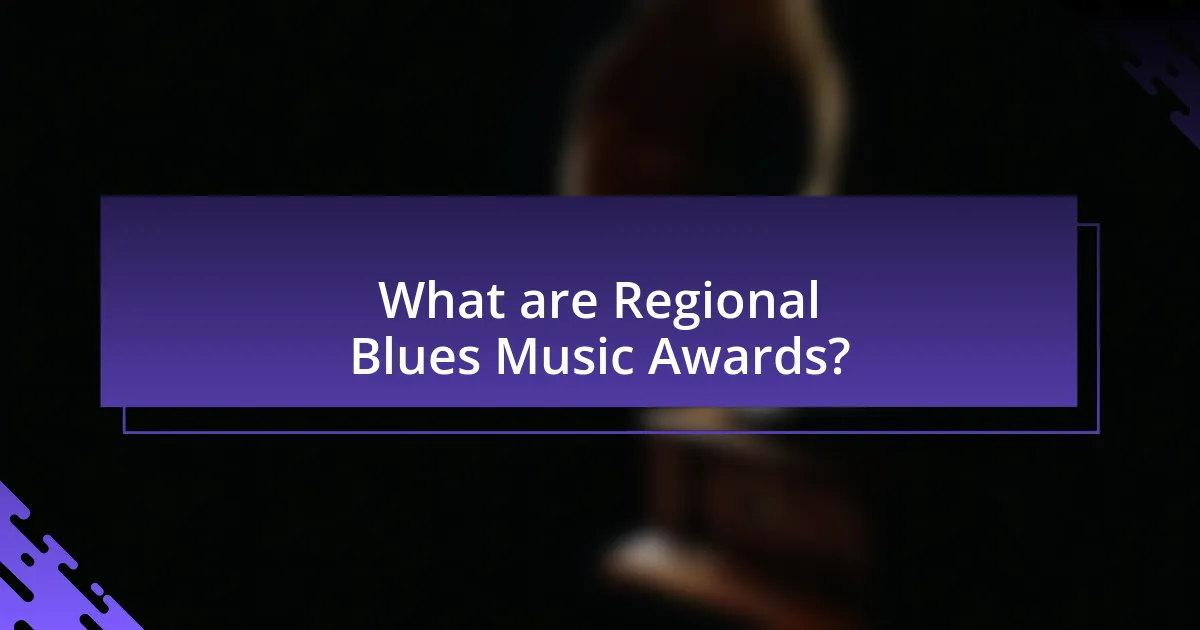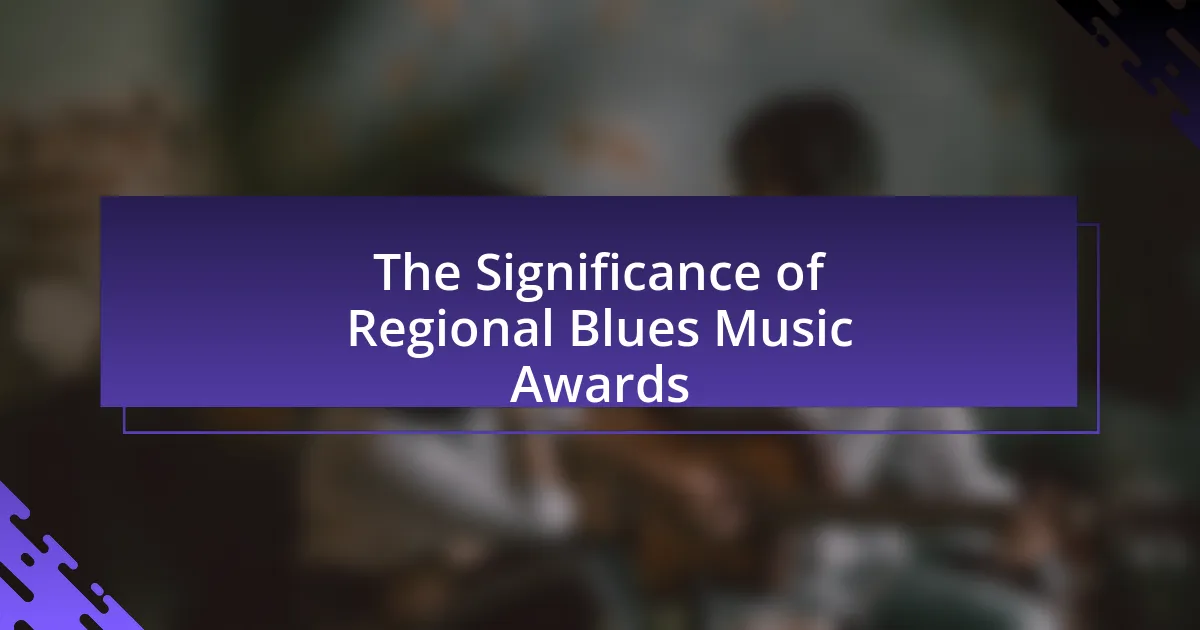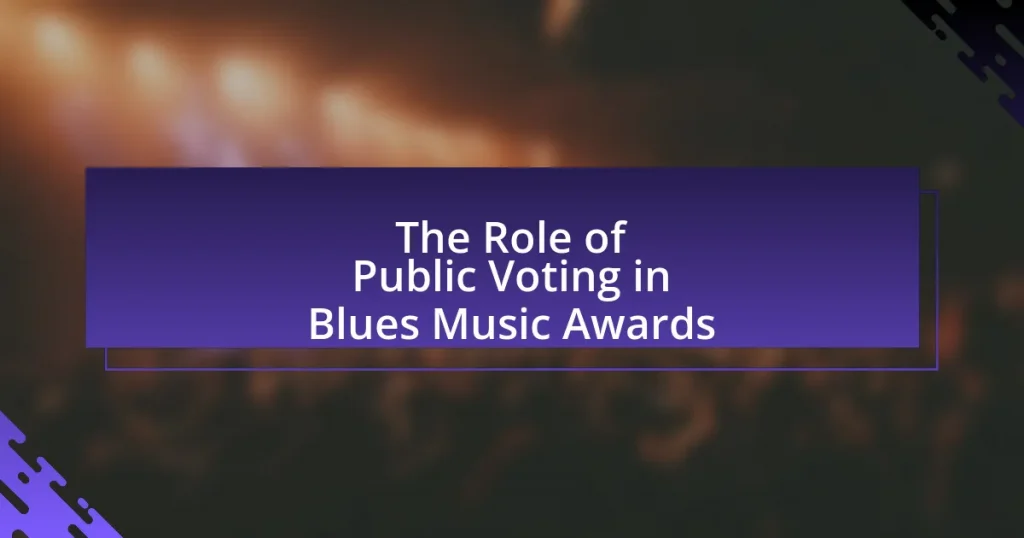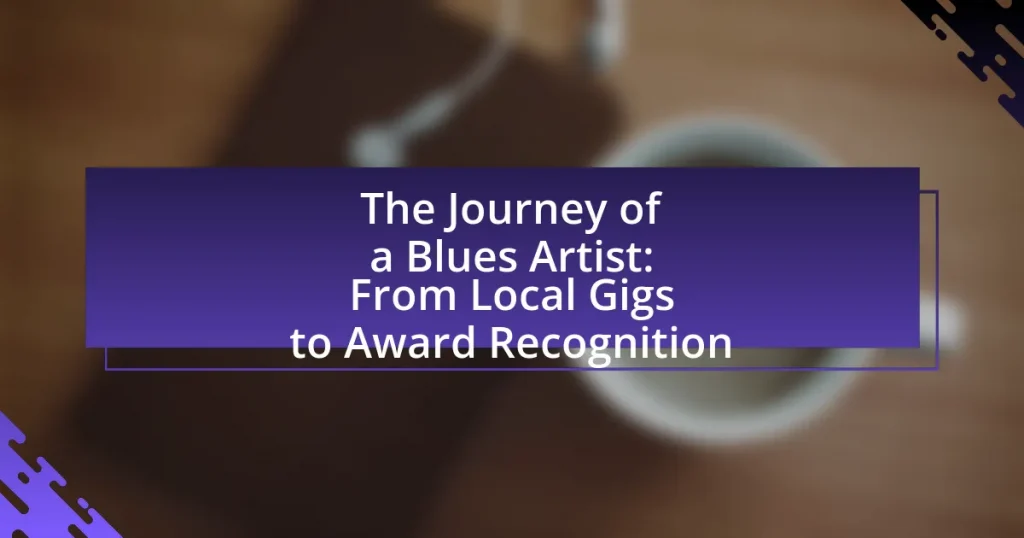Regional Blues Music Awards are events that recognize and celebrate exceptional achievements in the blues music genre within specific geographic areas. These awards promote local talent, foster community engagement, and highlight the cultural significance of blues music. The article explores how these awards differ from national awards, the criteria for determining winners, and the impact on artists’ careers. It also discusses the challenges faced by these awards, the importance of local recognition, and best practices for artists participating in the awards. Overall, the significance of Regional Blues Music Awards lies in their role in preserving blues heritage and supporting the local music community.

What are Regional Blues Music Awards?
Regional Blues Music Awards are recognition events that celebrate and honor outstanding achievements in the blues music genre within specific geographic areas. These awards aim to promote local talent, foster community engagement, and highlight the cultural significance of blues music in various regions. For instance, awards may be presented for categories such as Best Blues Artist, Best Album, and Best Performance, showcasing the contributions of musicians and industry professionals to the blues scene.
How do Regional Blues Music Awards differ from national awards?
Regional Blues Music Awards primarily focus on recognizing and celebrating local talent and contributions within specific geographic areas, while national awards encompass a broader scope, honoring artists and achievements across the entire country. Regional awards often highlight the unique styles, cultural influences, and community engagement of blues music in particular regions, such as the Mississippi Delta or Chicago, whereas national awards tend to emphasize overall excellence and popularity on a larger scale. For instance, the Blues Music Awards, organized by the Blues Foundation, recognizes artists from various regions but is considered a national event, contrasting with local awards that may only feature artists from a specific state or city.
What criteria are used to determine the winners of these awards?
The criteria used to determine the winners of regional blues music awards typically include artistic merit, originality, and overall impact on the blues genre. Judges evaluate the quality of the music, the performance skills of the artists, and the relevance of their contributions to the blues community. Additionally, factors such as public voting, industry peer reviews, and sales data may also influence the selection process, ensuring a comprehensive assessment of each nominee’s work and influence within the regional blues scene.
How do regional characteristics influence the awards?
Regional characteristics significantly influence the awards by shaping the criteria, categories, and recognition of local talent. For instance, awards may prioritize specific musical styles or cultural elements that resonate with the regional audience, reflecting the unique heritage and traditions of that area. In the context of blues music, regions like the Mississippi Delta emphasize traditional acoustic styles, while urban areas may focus on contemporary interpretations, thus affecting the types of artists and performances that are celebrated. This regional focus ensures that the awards remain relevant and meaningful to the local community, fostering a sense of pride and cultural identity.
Why are Regional Blues Music Awards important for artists?
Regional Blues Music Awards are important for artists because they provide recognition and validation within the music industry. This recognition can enhance an artist’s credibility, leading to increased visibility and opportunities for performances, collaborations, and record deals. Furthermore, winning or being nominated for such awards can significantly boost an artist’s profile, as evidenced by the fact that many award recipients experience a surge in album sales and streaming numbers following their accolades. This impact underscores the awards’ role in promoting artists and the blues genre as a whole.
What opportunities do these awards provide for emerging artists?
Regional Blues Music Awards provide emerging artists with significant exposure, networking opportunities, and potential financial support. These awards often feature performances that allow artists to showcase their talent to industry professionals and audiences, increasing their visibility. Additionally, winning or being nominated for an award can lead to connections with established musicians, producers, and record labels, facilitating career advancement. Financially, many awards come with cash prizes or grants that can be used for recording, marketing, or touring, directly impacting an artist’s ability to grow their career.
How do awards impact an artist’s career trajectory?
Awards significantly enhance an artist’s career trajectory by providing recognition, credibility, and increased visibility. Recognition from prestigious awards can validate an artist’s talent and efforts, leading to greater opportunities such as collaborations, performances, and media exposure. For instance, winning a Grammy can elevate an artist’s profile, resulting in a 30% increase in album sales, as reported by the Recording Industry Association of America. Additionally, awards often attract the attention of industry professionals, which can lead to lucrative contracts and sponsorships. Thus, the impact of awards on an artist’s career trajectory is profound, influencing both their marketability and longevity in the industry.
What role do Regional Blues Music Awards play in the music community?
Regional Blues Music Awards serve as a vital platform for recognizing and promoting blues artists within their communities. These awards not only celebrate artistic achievements but also foster local talent by providing visibility and opportunities for musicians to connect with audiences and industry professionals. For instance, the awards often highlight emerging artists, encouraging their growth and development in the music scene, which can lead to increased performances and collaborations. Additionally, the awards contribute to the cultural heritage of the blues genre, reinforcing its importance in the music community and ensuring its continued evolution and appreciation.
How do these awards foster community engagement and support?
Regional Blues Music Awards foster community engagement and support by recognizing local talent and promoting cultural pride. These awards create a platform for musicians to showcase their work, which encourages community members to participate in local events and support the arts. For instance, the awards often involve public voting and community events, which actively engage residents and foster a sense of belonging. Additionally, by highlighting local artists, the awards stimulate local economies through increased attendance at music venues and related businesses, thereby reinforcing community ties and support for the arts.
What is the significance of local recognition in the blues genre?
Local recognition in the blues genre is significant because it fosters community engagement and supports the preservation of cultural heritage. This recognition often comes through regional blues music awards, which highlight local artists and their contributions to the genre. For instance, awards like the Blues Music Awards and local competitions encourage musicians to develop their craft and connect with audiences, thereby enhancing the local music scene. Additionally, local recognition can lead to increased opportunities for artists, such as performances and collaborations, which are crucial for their growth and visibility in the broader music industry.
How do Regional Blues Music Awards contribute to the preservation of blues music?
Regional Blues Music Awards play a crucial role in the preservation of blues music by recognizing and promoting local artists, thereby ensuring the genre’s continued relevance and evolution. These awards provide a platform for emerging and established blues musicians to showcase their talent, which fosters community engagement and encourages the next generation of artists to explore and contribute to the blues tradition. By celebrating regional styles and influences, the awards help maintain the cultural heritage of blues music, ensuring that its diverse roots are honored and passed down. Furthermore, the visibility and recognition gained through these awards can lead to increased opportunities for artists, such as performances and collaborations, which further enrich the blues music landscape.
What initiatives are associated with these awards to promote blues heritage?
The initiatives associated with regional blues music awards to promote blues heritage include educational programs, community outreach, and artist support. Educational programs often involve workshops and seminars that teach the history and techniques of blues music, fostering appreciation among new generations. Community outreach initiatives may include festivals and events that celebrate local blues artists, thereby enhancing cultural visibility. Additionally, artist support initiatives provide resources such as grants and performance opportunities, which help sustain and promote the careers of blues musicians, ensuring the continuation of the genre’s rich heritage.
How do awards encourage the creation of new blues music?
Awards encourage the creation of new blues music by providing recognition and financial incentives to artists. This recognition motivates musicians to innovate and produce original works, as awards often lead to increased visibility and opportunities for performance. For instance, the Blues Music Awards, which honor outstanding achievements in the genre, have been shown to elevate the careers of winners, resulting in a surge of new music production. Additionally, the competitive nature of awards fosters a culture of creativity, pushing artists to explore new themes and styles within the blues genre.
What challenges do Regional Blues Music Awards face?
Regional Blues Music Awards face several challenges, including funding limitations, competition from larger music awards, and difficulties in attracting a diverse audience. Funding limitations often hinder the ability to host events, promote nominees, and provide adequate recognition for artists. Competition from larger, nationally recognized music awards can overshadow regional events, making it difficult to gain visibility and credibility. Additionally, attracting a diverse audience is challenging due to varying interests in music genres and the need for effective marketing strategies to engage different demographics. These challenges impact the overall success and sustainability of the awards.
How do funding and sponsorship issues affect the awards?
Funding and sponsorship issues significantly impact the awards by limiting the resources available for organizing and promoting the events. Insufficient funding can lead to reduced prize amounts, lower production quality, and diminished marketing efforts, which ultimately affect the visibility and prestige of the awards. For instance, a lack of sponsorship may result in fewer promotional activities, leading to decreased audience engagement and participation. Additionally, financial constraints can restrict the ability to attract high-profile judges and performers, further diminishing the awards’ overall appeal and credibility within the music community.
What are the common criticisms of these awards?
Common criticisms of regional blues music awards include perceived bias in the selection process, lack of transparency, and limited representation of diverse artists. Critics argue that awards often favor established artists over emerging talent, which can stifle innovation within the genre. Additionally, some believe that the voting panels may not adequately reflect the regional music community, leading to decisions that do not resonate with local audiences. These concerns highlight the need for a more inclusive and equitable approach to recognizing talent in the blues music scene.
What are the best practices for participating in Regional Blues Music Awards?
To successfully participate in Regional Blues Music Awards, artists should focus on submitting high-quality recordings that showcase their unique style and talent. Ensuring that the music is professionally produced and mixed enhances the chances of recognition, as awards often consider sound quality as a key factor. Additionally, artists should familiarize themselves with the specific eligibility criteria and submission guidelines of the awards, as these can vary by region and year. Engaging with the local blues community through performances and networking can also increase visibility and support, which is crucial for gaining votes or recognition from judges. Finally, promoting the submission through social media and local press can help garner attention and increase the likelihood of success, as public interest can influence award outcomes.
How can artists effectively prepare for submission to these awards?
Artists can effectively prepare for submission to regional blues music awards by thoroughly understanding the submission guidelines and tailoring their materials accordingly. This includes reviewing eligibility criteria, required formats, and deadlines, which are often outlined on the award’s official website. Additionally, artists should curate their best work, ensuring that recordings are of high quality and representative of their style. Engaging with past winners or nominees can provide insights into what judges look for, enhancing the artist’s chances of success. Research indicates that submissions that align closely with the award’s mission and values tend to perform better, as seen in the success rates of artists who have strategically matched their submissions to the award’s criteria.
What strategies can increase an artist’s chances of winning?
To increase an artist’s chances of winning at Regional Blues Music Awards, artists should focus on building a strong local following, engaging with their community, and consistently producing high-quality music. A strong local following can be cultivated through live performances, social media engagement, and collaborations with other local artists, which enhances visibility and support. Engaging with the community through events and outreach can create a loyal fan base that actively votes for the artist. Additionally, producing high-quality music that resonates with the audience can lead to nominations and wins, as awards often consider artistic merit and popularity. Historical data shows that artists who actively participate in their local music scene and maintain a consistent presence are more likely to receive recognition and accolades.



